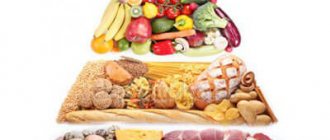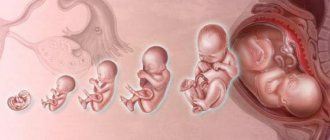The importance of proper nutrition during pregnancy
During pregnancy, the embryo is completely dependent on the mother's body. The woman's nutrition provides the needs of both. A balanced menu is important for the formation of all organ systems of the child, the development of immunity and his health in the future. A lack of substances can lead to developmental disorders and congenital diseases (diabetes, decreased vision, hearing).
Proper nutrition alleviates the unpleasant symptoms of pregnancy (toxicosis, swelling) and allows you to gain weight evenly, within normal limits. Eating healthy food gives the body enough energy to cope with childbirth and recover in the postpartum period.
What are the dangers of being overweight for an expectant mother?
Too rapid weight gain and excess weight gain increase the risks of the following complications:
- late toxicosis (gestosis);
- deterioration of blood circulation in the placenta, detachment of the placenta and its premature aging;
- fetal hypoxia;
- premature and prolonged labor, weak labor activity;
- uterine bleeding;
- post-term pregnancy;
- eclampsia;
- birth of a large fetus;
- varicose veins of the lower extremities.
Poor nutrition leads to digestive problems (constipation, heartburn, etc.), severe swelling. Obesity increases the load on the cardiovascular system during pregnancy and childbirth.
Useful vitamins, minerals, elements during pregnancy
Nutrients and vitamins are the main material for the formation of the child’s organs and systems.
The expectant mother needs:
- Squirrels - with their help, intrauterine growth and development occurs. Animal proteins should make up 60% of the total.
- Fats - for the formation of organs and the absorption of vitamins. With a lack of fats and fatty acids, there is a risk of pregnancy failure or miscarriage.
- Carbohydrates create energy reserves and promote physiological weight gain.
- Minerals : iron affects the growth of muscles and the hematopoietic system, prevents anemia in a pregnant woman, selenium and zinc are needed by the nervous and immune systems, calcium forms the skeleton, hair and teeth, iodine is useful for brain development and prevents thyroid diseases during pregnancy.
- Vitamins : A is needed for the development of vision and hearing in the fetus, vitamins of group B affect the formation of the nervous and cardiovascular systems, C forms immunity and improves the absorption of iron.
- Fiber - improves digestion, solves the problem of constipation and heartburn.
Healthy recipes for pregnant women
Vegetable soup
Required:
- 5 potatoes;
- 500 g cauliflower;
- 200 g green peas;
- 1 grated carrot.
Preparation:
- peel and cut the potatoes, add water and put on fire;
- bring until half cooked, add white cabbage, grated carrots, green peas;
- 5 minutes before all ingredients are ready, add salt and pepper.
Cream soup
Required:
- chicken bouillon;
- 2 pcs. Luke;
- 5 potatoes;
- 100 g milk;
- 50 g butter;
- seasonings;
- greenery.
Preparation:
- Melt the butter in an empty saucepan, add chopped onion, stir and cover with a lid;
- simmer for 10 minutes over low heat;
- add chopped potatoes;
- season;
- simmer covered for 10 minutes;
- pour in the broth;
- cook for 25 minutes;
- turn off the heat and cool;
- Bring the cooled dish to puree;
- reheat and add milk;
- garnish when serving.
Puff potato
Required:
- 15 pcs. potatoes;
- 4 things. Luke;
- 2 trays of chicken legs;
- 400 g cheese;
- 400 g sour cream 15%;
- seasonings
Preparation:
- prepare ingredients, peel, cut;
- marinate chicken and potatoes in sour cream;
- wait 1 hour;
- place potatoes-onion-meat in sequence on a baking sheet;
- bake for 50 minutes at 220 °C;
- sprinkle with cheese and leave until completely melted.
Braised cabbage
Required:
- 1 head of cabbage;
- 3 tbsp. tomato paste;
- seasonings;
- carrot;
- onion.
Preparation:
- grate carrots, chop onions, chop cabbage;
- mix;
- add water;
- put on fire and cover;
- cook until cabbage is soft;
- add pasta;
- season.
Classic salad
Required:
- 4 cucumbers;
- 6 tomatoes;
- seasonings
Preparation:
- wash and chop vegetables;
- mix;
- season;
- wait until the tomatoes release their juice from the pulp.
Classic salad for pregnant women
Required:
- 2 fresh gherkins;
- 5 tomatoes;
- 2 pickled cucumbers;
- 4 boiled eggs;
- seasonings
Preparation:
- prepare ingredients;
- chop and mix;
- season;
- do not add salt.
Fruit salad
Required:
- 1 tangerine;
- 1 apple;
- snowball.
Preparation:
- peel fruit;
- slice;
- fill with snow;
- do not sugar.
Diet sweets
Required:
- 4 bananas;
- ½ chocolate bar;
- toothpicks.
Preparation:
- Peel and cut banana into slices;
- melt chocolate;
- place fruit slices on toothpicks;
- dip in chocolate;
- put in the freezer for 30 minutes.
Morse
Required:
- Any berries;
- 1 liter of water;
- 1 tbsp. Sahara.
Preparation:
- boil water;
- pour out the berries;
- sweeten;
- cook for 15 minutes.
Compote
Required:
- dried fruit mixture;
- 1 liter of water;
- 1 tbsp. Sahara.
Preparation:
- boil water;
- pour dried fruits;
- sweeten;
- cook 30 min.
Weight loss during pregnancy is not only not contraindicated, but is even recommended for girls with excess body weight and or rapid weight gain. With a competent approach to diet, no negative consequences will arise.
Power Errors
Main mistakes:
- Binge eating. The most common mistake in pregnant women's diet is overeating. Changes in taste preferences and ignorance of the physiological needs of the body during this period lead to excess weight gain. Overeating provokes acquired diabetes in pregnant women and disrupts the metabolism in the child’s body. To the usual calorie intake for a woman (2500 per day), only 200 are added daily in the 1st trimester, and 300 in the 2nd and 3rd trimester;
- Alcohol. Alcohol abuse harms both the woman and the child. Ethyl alcohol easily penetrates the placental barrier. In the early stages, alcoholic drinks cause developmental defects and mental retardation. Obstetricians allow pregnant women half a glass of weak wine on holidays, but it is better to give up alcohol until the end of breastfeeding;
- Frequent snacking with sweets (tea with sweets, buns) disrupts metabolism and increases the chances of secondary diabetes. Easily available carbohydrates from confectionery products put a strain on the pancreas. As a result, food is digested worse, nausea, heartburn, and constipation appear;
- Diets. Nutrition during pregnancy should be as varied as possible, so diets and fasting should be postponed. Calorie restriction or mono-diet lead to insufficient intake of nutrients. Due to maternal starvation, the child may be born underweight or have developmental problems in the future;
- Violation of the principle of seasonality and zoning of products can provoke allergies. You can buy strawberries and papaya in winter, but chances are they are treated with preservatives to preserve them during travel. Nutritionists recommend eating those fruits that grow in climatic conditions familiar to humans at this time of year. In winter, it is better to get vitamins from homemade preparations - jam, marshmallows, dried fruit compote.
Diet and nutrition in the 2nd trimester
In the second trimester of pregnancy, almost all the most important systems and organs have already been formed and are actively developing, the brain mass increases, the fetus begins to breathe, so it is necessary not only to include in the menu products that promote the processes of growth and development, but also to ensure the supply of a sufficient amount of oxygen.
During the same period, the rudiments of teeth are laid, the skeletal system is strengthened, therefore, it is necessary to ensure a sufficient amount of calcium entering the body. However, calcium is effectively absorbed only in combination with vitamin D, so foods need to be consumed in the right combination, or simply eat foods that are rich in both calcium and vitamin D:
- dairy products,
- spinach,
- liver of pollock (or other sea fish)
- raisin,
- egg yolk,
- butter.
At this stage, it is important to reduce the amount of salt and control the amount of fluid entering the body, as well as control the consumption of carbohydrates, since their excess can lead to excessive weight gain. Walking in the fresh air is very useful (remember that the baby especially needs oxygen now).
It is recommended to exclude from the diet in the 2nd trimester:
- spicy and smoked,
- fried and fatty foods,
- sausages and sausages,
- flour and sweet.
Good to know! In the 2nd trimester, eat allergenic foods (citrus fruits, exotic fruits, strawberries) with caution; eat them rarely and in small portions so that the child is not born with allergies.
During this period, the fetus has practically formed the genitourinary system, and the mother’s liver is especially subject to stress, cleansing the body of toxins. Help her by simply eliminating certain foods. Flour and sweet foods can provoke uncontrolled weight gain, not for the baby, but for yours, which can lead to varicose veins and pain in the legs. If you already have health problems, it is better to stick to a diet for liver diseases, but only after consulting a doctor.
Diet features
In the first trimester
The period from 1 to 12 weeks of pregnancy is the most crucial for the child and mother. There is a sharp change in hormonal levels, which causes toxicosis. The woman experiences nausea, taste preferences change, and sensitivity to smells worsens.
The following will help reduce the manifestations of toxicosis:
- vitamins, mineral food supplements - ensure the development of all organ systems of the fetus and support the pregnant woman’s body. Vitamin B9 (folic acid) is especially important; there is a lot of it in leafy vegetables (Chinese cabbage, spinach);
- light dishes cooked in a steamer or oven - low-fat foods will ease nausea. During toxicosis, meat and fish should be replaced with soy tofu, milk, eggs;
- a large amount of fiber from fruits and bran - gently stimulates intestinal function and prevents constipation;
- food temperature is 15 - 60 C° - too cold or hot food provokes nausea.
In the second
After 12 weeks, all organs of the embryo are formed and their active growth begins. The woman’s appetite returns, and the body’s need for protein and minerals increases.
In the 2nd trimester it is recommended:
- increase the amount of protein foods (meat, beans, fish) - the structures of the child’s body are built from protein, active growth of organs occurs;
- take vitamin complexes - calcium, magnesium ensure the growth of bones and teeth, vitamin C helps absorb iron and calcium, magnesium prevents the development of cramps (occurs in pregnant women with a large lack of minerals);
- drink more purified water (2 liters per day) - speeds up metabolism, removes waste products in the urine;
- eat unsalted food - salt retains fluid in the body, increasing the risk of edema;
- eating small portions, not overeating before bed - measures to combat heartburn, heaviness, constipation.
In third
In the final stages of pregnancy, a woman needs less filling food and more energy.
To maintain strength for childbirth, you should:
- reduce the amount of protein in the diet, replace animal protein with vegetable protein - it is easier to digest. Before giving birth, it is recommended to eat lean poultry, soy, dairy products, and legumes;
- eat in small portions (7 - 8 times a day) - intestinal pressure on the enlarged uterus is reduced;
- to normalize intestinal motility, consume bran, fruits, herbs, root vegetables, and vegetable juices;
- take vitamin E - increases the elasticity of the pelvic muscles, prevents cracks and ruptures during childbirth.
Nutrition in the first trimester of pregnancy (1-13 weeks)
The diet of a woman in the early stages of pregnancy is practically no different from the diet of an ordinary person. There is only a need to choose high-quality and environmentally friendly food products. Still, some dietary features during these weeks need to be taken into account.
Photo pixabay.com
- Lack of folic acid.
Vitamin B9 (folic acid) deficiency may appear as early as 1-4 weeks after conception, depending on the mother’s diet and its supply in her body. This vitamin is especially important in the first trimester of pregnancy, because it is necessary for normal cell division, growth and development of all organs and tissues of the child, and it plays a special role in the formation of the basic structures of the baby’s nervous system. In a pregnant woman, a lack of folic acid can manifest itself in the form of increased fatigue, irritability and loss of appetite.
The main sources of vitamin B9 are:- Legumes;
- Spinach;
- Cabbage;
- Green onions;
- Peas;
- Salad;
- Beet;
- Soy;
- Tomatoes;
- Carrot;
- Cheese;
- Caviar;
- Kidneys;
- Liver;
- Cottage cheese;
- Egg yolk.
- Increased caloric content of food.
Many women, having learned that they are pregnant, having listened to the advice of grandmothers and mothers, begin to eat for two. Eating high-calorie foods in the early stages of pregnancy leads to excess weight, which will not be easy to get rid of later. Women should understand that at this stage the baby’s energy needs are not great, and, therefore, all the “extra” will go to you. - We fight toxicosis.
Early gestosis (toxicosis) usually occurs in the first trimester and manifests itself in the morning in the form of poor health, nausea, vomiting, and loss of appetite. To reduce these discomforts, try not to get up immediately after waking up. Eat a cracker or biscuits, drink a glass of still water. During the day, eat food, preferably warm, in small portions every 2-3 hours so as not to overload your stomach. It is better to eat either a dense or liquid dish at one time, without combining them. Give preference to fruits, vegetables, baked, boiled and steamed dishes. It is better to avoid fried, smoked, spicy and canned foods. Keep in mind that vomiting leads to the loss of minerals, including salt, so you should not completely abandon moderately salted foods during early gestosis.
What should be included in the menu during pregnancy by week
Nutrition during pregnancy varies depending on the period. Different stages of intrauterine development require different nutrients. It depends on what organs and functions of the child’s body are developing at the moment.
| weeks | What happens in the body | What to include in the diet, nutritional features |
| 1 — 3 | Pregnancy planning, conception | Folic acid supplements, leafy greens, yellow fruits and vegetables (vitamins A, C, lycopene). |
| 3 — 4 | The fetus implants in the uterus and the placenta develops | Products rich in manganese (oatmeal, eggs, dried fruits), calcium (green fruits, milk). |
| 5 — 6 | Hormonal changes, toxicosis | Vegetable protein instead of animal protein (cheese, soy meat, nuts), replenish the water balance with 1.5 - 2 liters of water daily. |
| 7 — 8 | The uterus grows, squeezes the intestines, there may be constipation | Dried fruits, fresh fruits rich in fiber (apples, plums, peaches), kefir. |
| 9 — 12 | All fetal organ systems develop intensively | Lots of protein (fish, poultry, cottage cheese), fiber (vegetables, cereals, whole grain bread), multivitamins. |
| 13 — 16 | Organ formation is complete, growth begins | Increase the calorie content of the menu with porridges (buckwheat, oatmeal), red meat (beef, veal). |
| 16 — 24 | Sense organs develop - vision, hearing | Vitamin A, -carotene (red fruits, vegetables, root vegetables plus vegetable fat). |
| 24 — 28 | The fetus and uterus are actively growing, squeezing the abdominal organs of the pregnant woman | Eat often, little by little, exclude spices and salt. Take multivitamins at any time of the year. |
| 29 — 34 | The growth of teeth, bones, the development of the fetal nervous system ends | Calcium and fatty acids (fish, cottage cheese, nuts). |
| 35 - childbirth | The fetus is fully formed, the woman's body is preparing for childbirth | Less proteins, fats, more carbohydrates (replace meat with vegetables, cereals). |
Menu in the third trimester
| Days of the week | Eating | Menu: products and dishes |
| Day 1 | Breakfast | Milk porridge |
| Lunch | Raisins, dried fruits | |
| Dinner | Vegetable soup | |
| Afternoon snack | Ryazhenka or kefir | |
| Dinner | Buckwheat porridge with steam cutlet | |
| Before bedtime | Fruit | |
| Day 2 | Breakfast | Tea with milk or dry biscuits |
| Lunch | Yogurt or fruit | |
| Dinner | Pasta with vegetables | |
| Afternoon snack | Vegetable salad with spinach, tomatoes and olives | |
| Dinner | Diet pilaf in a slow cooker | |
| Before bedtime | Ryazhenka or kefir | |
| Day 3 | Breakfast | Tea and butter sandwich |
| Lunch | Light seaweed salad with egg | |
| Dinner | Fish soup | |
| Afternoon snack | Cottage cheese | |
| Dinner | Puree with fish or lean meat | |
| Before bedtime | Fruit salad or juice | |
| Day 4 | Breakfast | Bread with butter. Boiled egg. Herb tea |
| Lunch | Fruits to choose from | |
| Dinner | Borscht, vegetable salad. | |
| Afternoon snack | Apple or pear | |
| Dinner | Salad with rice, egg and tuna | |
| Before bedtime | Yogurt or fruit | |
| Day 5 | Breakfast | Cottage cheese with jam or grated berries |
| Lunch | Orange juice | |
| Dinner | Roast beef with vegetables. Herb tea | |
| Afternoon snack | Any seasonal fruit | |
| Dinner | Rice with steamed vegetables. | |
| Before bedtime | Kefir | |
| Day 6 | Breakfast | Oatmeal with milk and dried apricots |
| Lunch | Sandwich with lightly salted salmon | |
| Dinner | Pumpkin puree soup. Chicken breast baked with tomatoes | |
| Afternoon snack | Smoothie from berries and kefir | |
| Dinner | Boiled fish with rice | |
| Before bedtime | Ryazhenka or kefir | |
| Day 7 | Breakfast | Cheesecakes with sour cream |
| Lunch | Nuts | |
| Dinner | Fish cutlet with pasta or rice. Vegetable Salad | |
| Afternoon snack | Fruits to choose from | |
| Dinner | Lazy cabbage rolls | |
| Before bedtime | Herbal tea or glass of milk |
Good to know! In the last month of pregnancy, it is better to exclude light carbohydrates from the diet: sugar, flour, jam and honey, and avoid fatty foods. This will allow you to prepare for childbirth, reduce the weight of the fetus and facilitate its birth.
You can skip porridge or tea with cookies, but don't give up soup. Let it be simple noodles cooked in meat or chicken broth, your stomach needs hot food and no drink can replace it. The general principle of nutrition during pregnancy, regardless of the trimester, is to eat more often, but make smaller portions. If you really want something, eat a little, because most often during pregnancy you want something that the body lacks, for example, zinc, which ordinary seeds are rich in. One more nuance that should not be forgotten. No matter how fully organized the diet is during pregnancy, it is impossible to get all the necessary substances from food alone. Therefore, doctors prescribe special vitamins for pregnant women and preparations containing iodine, magnesium and, if necessary, iron. This precaution reduces the risk of the fetus not receiving vital vitamins, micro- and macroelements tenfold.
A video about nutrition during pregnancy will briefly talk about nutrition and give useful tips:
Useful foods during pregnancy
A pregnant woman should diversify and enrich her menu as much as possible.
The healthiest foods you should eat daily:
- Meat is a source of animal protein and iron. Pregnant women benefit from fresh, or at least chilled, meat. It is not advisable to buy frozen meat or semi-finished products.
- Fish - contains calcium, phosphorus, vitamin D, good for bones and brain. The most useful are fresh sea white fish (hake, halibut, cod).
- Milk and its products contain calcium and fatty acids that strengthen bones and support the immune system. It is forbidden to consume country dairy products that have not undergone heat treatment.
- Eggs - Omega-3, selenium, zinc for intelligence development. Pregnant women should not eat raw eggs; dishes with them pose a risk of salmonellosis.
- Nuts - contain vegetable protein, vitamin E, fatty acids. Nuts are good for the immune and nervous systems.
- Green vegetables, leafy greens are sources of vitamin C, B9 (folic acid), stimulate the immune system, and remove toxins.
- Red fruits, garden berries - vitamin A, iodine, lycopene, good for vision and normal metabolism.
- Cereals (oats, buckwheat, sorghum, wheat) - contain iron and fiber, solve the problem of constipation. It is recommended to replace steamed white rice with brown rice; sprouted seeds are beneficial.
Daily intake of vitamins and microelements for pregnant women
- vitamin A - 800 mcg
- vitamin D - 10 mcg
- vitamin K - 65 mcg
- vitamin E – 10 mg
- vitamin C – 70 mg
- vitamin B1 - 1.5 mg
- vitamin B2 - 1.6 mg
- vitamin B6 - 2.2 mg
- vitamin B12 - 2.2 mcg
- vitamin PP – 17 mg
- folic acid - 400 mcg
Microelements:
- calcium - 1200 mg
- phosphorus - 1200 mg
- magnesium - 320 mg
- iron - 30 mg
- zinc - 15 mg
- iodine - 175 mcg
- selenium - 65 mcg
Table of strictly prohibited foods
Pregnancy imposes restrictions on your diet. A woman who wants to carry and give birth to a healthy child has to give up some familiar foods.
The principles of nutrition during pregnancy require a categorical refusal of a number of foods.
| Products | Harmful effects |
| Alcohol | In the early stages of pregnancy, ethyl alcohol causes fetal malformations and the threat of miscarriage. |
| Raw meat, fish | Raw foods may contain helminthic infections - listeria, toxoplasma, which are especially dangerous for the embryo. |
| Unpasteurized dairy products | Unprocessed milk is a favorable environment for salmonella to live. Salmonellosis is dangerous due to poisoning by toxins, disruption of the liver and kidneys. |
| Salted caviar, dried fish | A large amount of salt in foods causes thirst, fluid retention, and swelling. |
| Ready-made canned food, sauces, snacks (chips, croutons) | Finished products contain a lot of salt, food additives, and artificial colors. Preservatives and additives are harmful to children and adults. |
| Carbonated drinks | Sweet carbonated water causes bloating and disrupts the movement of food in the intestines. |
| Strong tea, coffee | Drinks with large amounts of tannin and caffeine increase blood pressure and increase muscle tone - creating conditions for premature birth. |
| Fatty, smoked, spicy dishes | Peppered and fried foods increase the load on the liver and kidneys of a pregnant woman, and can provoke an exacerbation of gastritis. |
Authorized Products
In the diet during pregnancy, with a body weight exceeding the norm, it is necessary to introduce first courses in the form of weak and low-fat vegetable, meat and fish broths and soups with the addition of cereals or potatoes in a volume of no more than 200 ml/day. For meat products, lean varieties of red meat (veal, beef), rabbit, and poultry (turkey, chicken) are recommended. The content of meat dishes in the daily diet should not exceed 150 g. Meat dishes are recommended to be steamed, baked in the oven, after preliminary boiling.
It is recommended to cook steam cutlets and puddings, meat rolls, meatballs, meat and vegetable zrazy. The daily intake of seafood and fish dishes from low-fat fish varieties (pike perch, cod) should be about 150 g, from which it is better to prepare meatballs, steamed fish cutlets, rolls with vegetables, and fish puree. Of the fats, vegetable oils must be present in the diet.
Be sure to include in the diet whole milk in a volume of 200 ml/day and various dairy (fermented milk) products with low fat content. Consumption of bread and flour products should not exceed 100-150 g per day. Preference should be given to day-old rye bread or bran bread, wholemeal bread, savory cookies or biscuits. The diet includes chicken eggs (1-2 per week), preferably in the form of steamed omelets or soft-boiled.
It is better to use pasta (vermicelli, spaghetti, noodles) in soups, and for side dishes give preference to porridges from various cereals. In the diet of a pregnant woman with increased body weight, a large proportion should be occupied by vegetables and fruits (tomatoes, bell peppers, different varieties of cabbage, cucumbers, zucchini, pumpkin, carrots), both raw and processed. Parsley, dill, lettuce, and green onions are used as seasonings for main dishes.
Drinks in the diet should include weak tea with milk, rosehip decoction, unsweetened fruit and berry compotes, diluted pureed juices from various berries and fruits, and still mineral water.
Table of permitted products
| Proteins, g | Fats, g | Carbohydrates, g | Calories, kcal | |
Vegetables and greens | ||||
| zucchini | 0,6 | 0,3 | 4,6 | 24 |
| cauliflower | 2,5 | 0,3 | 5,4 | 30 |
| potato | 2,0 | 0,4 | 18,1 | 80 |
| carrot | 1,3 | 0,1 | 6,9 | 32 |
Fruits | ||||
| apricots | 0,9 | 0,1 | 10,8 | 41 |
| watermelon | 0,6 | 0,1 | 5,8 | 25 |
| melon | 0,6 | 0,3 | 7,4 | 33 |
| nectarine | 0,9 | 0,2 | 11,8 | 48 |
| peaches | 0,9 | 0,1 | 11,3 | 46 |
| apples | 0,4 | 0,4 | 9,8 | 47 |
Berries | ||||
| strawberry | 0,8 | 0,4 | 7,5 | 41 |
| raspberries | 0,8 | 0,5 | 8,3 | 46 |
Cereals and porridges | ||||
| buckwheat (kernel) | 12,6 | 3,3 | 62,1 | 313 |
| cereals | 11,9 | 7,2 | 69,3 | 366 |
| pearl barley | 9,3 | 1,1 | 73,7 | 320 |
| white rice | 6,7 | 0,7 | 78,9 | 344 |
| barley grits | 10,4 | 1,3 | 66,3 | 324 |
Confectionery | ||||
| marshmallows | 0,8 | 0,0 | 78,5 | 304 |
| meringues | 2,6 | 20,8 | 60,5 | 440 |
| paste | 0,5 | 0,0 | 80,8 | 310 |
Raw materials and seasonings | ||||
| milk sauce | 2,0 | 7,1 | 5,2 | 84 |
Dairy | ||||
| milk | 3,2 | 3,6 | 4,8 | 64 |
| kefir 2% | 3,4 | 2,0 | 4,7 | 51 |
| cream 15% (low fat) | 2,3 | 15,0 | 3,6 | 161 |
| sour cream 15% (low fat) | 2,6 | 15,0 | 3,0 | 158 |
| curdled milk | 2,9 | 2,5 | 4,1 | 53 |
Cheeses and cottage cheese | ||||
| cottage cheese 1.8% (low-fat) | 18,0 | 1,8 | 3,3 | 101 |
Meat products | ||||
| boiled beef | 25,8 | 16,8 | 0,0 | 254 |
| beef liver | 17,4 | 3,1 | 0,0 | 98 |
| boiled beef tongue | 23,9 | 15,0 | 0,0 | 231 |
| boiled veal | 30,7 | 0,9 | 0,0 | 131 |
| rabbit | 21,0 | 8,0 | 0,0 | 156 |
Bird | ||||
| boiled chicken | 25,2 | 7,4 | 0,0 | 170 |
| turkey | 19,2 | 0,7 | 0,0 | 84 |
Eggs | ||||
| chicken eggs | 12,7 | 10,9 | 0,7 | 157 |
Fish and seafood | ||||
| salmon caviar granular | 32,0 | 15,0 | 0,0 | 263 |
Oils and fats | ||||
| butter | 0,5 | 82,5 | 0,8 | 748 |
| ghee | 0,2 | 99,0 | 0,0 | 892 |
Non-alcoholic drinks | ||||
| mineral water | 0,0 | 0,0 | 0,0 | — |
Juices and compotes | ||||
| apricot juice | 0,9 | 0,1 | 9,0 | 38 |
| carrot juice | 1,1 | 0,1 | 6,4 | 28 |
| pumpkin juice | 0,0 | 0,0 | 9,0 | 38 |
| * data is per 100 g of product | ||||
Normal weight gain during pregnancy
Correct, uniform weight gain means a normal pregnancy. Obesity or excessive weight loss entails a violation of the intrauterine development of the child. The average weight gain during the entire pregnancy is 12 kg; to find the individual norm, you should calculate the body mass index:
BMI = weight (kg) : height (m)²
- ≤ 19 - weight deficit, allowed to gain 12 - 17 kg.
- 19 - 21 - normal body weight, total gain of 10 - 15 kg.
- 20 - 30 - fullness, weight gain 6 - 10 kg.
- ≥30 – obesity, sharp limitation of weight gain to 6 kg.
A pregnant woman's weight increases unevenly. The 1st trimester is characterized by decreased appetite due to toxicosis, the woman gains a maximum of 3 kg. In the 2nd trimester, intensive fetal growth begins, requiring a lot of nutrients.
Mid-pregnancy weight gain is the highest - about 7 kg. The 3rd trimester completes the development of the child and prepares the female body for childbirth. Weight gain before childbirth reaches 5 kg.
Food hygiene
Hygiene and nutrition of a pregnant woman are interconnected concepts, because the health of the expectant mother, and, therefore, the normal course of pregnancy, largely depends on food hygiene. You need to prepare food for a pregnant woman in compliance with all hygiene rules. After all, poisoning or food allergies are very dangerous conditions during pregnancy. Therefore, women in an “interesting” position are advised to follow several important rules:
- It is important to take into account the fact that during the period of bearing a baby, allergies can be triggered even by those products that previously did not cause any reactions.
- It is very important to wash your hands thoroughly before eating. This rule is undeniable for everyone, but it is especially important for pregnant women not to forget about it.
- When buying groceries, a woman must pay close attention to the expiration date of the products.
- You should drink boiled or bottled water. Expectant mothers should not drink regular tap water.
- You should also wash all vegetables and fruits very thoroughly.
How to avoid gaining excess weight: practical recommendations
Nutrition during pregnancy should replenish the body's energy costs without causing excessive weight gain.
Obesity in a pregnant woman causes hypertension, metabolic disorders, varicose veins, and complicates the birth process. Excess weight often appears due to the consumption of easily digestible carbohydrates (sweets, pure sugar). Towards the end of pregnancy, fluid retention causes swelling. Excess water in the body affects the weight and well-being of a pregnant woman.
To avoid excess weight, a pregnant woman should:
- limit the consumption of easily digestible carbohydrates (chocolate, baked goods), after 20 weeks you should completely abandon them;
- increase the content of complex carbohydrates (cereals, nuts, vegetables except potatoes, berries) in the daily diet;
- give up salt, smoked, pickled foods, which retain water and create excessive stress on the urinary system;
- eat fresh food, increase the content of vitamins instead of calorie content of dishes;
- choose gentle physical activity (yoga, fitness, swimming for pregnant women).
How to eat during pregnancy to avoid gaining excess weight:
What foods should be in a pregnant woman's diet?
- Fermented milk products: cottage cheese, yogurt, kefir.
- Fish, meat and seafood.
- Cereals (especially buckwheat and oats) are a source of essential microelements.
- Fruits and vegetables - preferably growing in the same climate zone. (If you gain a lot of weight, limit bananas and nuts).
- Dried fruits - raisins, dried apricots, prunes, figs, dates.
- Vegetable oil (olive) at least 2-3 tablespoons per day.
- Sweets, fresh bread and flour products should be limited.
How to Gain Weight During Pregnancy
Being underweight during pregnancy is more harmful than being overweight. Starvation and malnutrition of the mother create the risk of having a child with low weight, developmental delays, and metabolic disorders. A common reason for weight loss in the 1st half of pregnancy is lack of appetite due to nausea.
The following will help you cope with the manifestations of toxicosis and gain sufficient weight:
- mandatory carbohydrate-protein breakfast (porridge, cottage cheese, eggs, cheese) - the first meal provides a daily supply of energy;
- frequent split meals in small portions - creates a uniform supply of nutrients, helps cope with nausea and lack of appetite;
- enriching the menu with the addition of healthy fats (butter, sour cream);
- dried fruits, nuts - high-calorie, healthy foods;
- Walking and physical activity reduce nausea and stimulate appetite.
Fractional meals. Sample menu for the week
A clear example of a menu compiled specifically for fractional meals will help you navigate when switching to this type of nutrition. Don't forget to drink water half an hour before meals or half an hour after. If physical exercise is performed, the break from meals should be at least an hour. Correct fractional division of food throughout the week:
- Breakfast: oatmeal/muesli with milk/bran porridge, whole grain bread with butter, apple/orange, tea/weak natural coffee.
- Second breakfast: one large apple/a glass of natural yogurt/70 grams of low-fat cottage cheese with a spoon of honey/a slice of whole grain bread with cheese.
- Lunch: a piece of meat with a salad of green vegetables/a portion of soup with a piece of bran bread, lean fish/a small piece of chicken fillet with baked vegetables, a portion of vegetable soup.
- Afternoon snack: some dried fruit of one type/muesli bar with tea/low-fat cottage cheese/freshly squeezed juice/fruit.
- Dinner: baked or boiled fish, meat, boiled egg, cheese with vegetable salad or a portion of baked vegetables.
- At night (1 hour before bedtime): a glass of kefir or half a glass of natural yogurt.
Drinking regime: features during pregnancy
Nutrition during pregnancy should include a sufficient amount of healthy fluid.
A healthy woman is allowed 2 liters per day; closer to childbirth, the norm is reduced to 1.5 liters per day to prevent edema.
Pure drinking still water is best for pregnant women. Water removes harmful substances, metabolic products, and stimulates blood circulation. Tea and coffee should be drunk in the morning, brewed weakly, and the amount limited (1 cup per day). In the absence of contraindications or allergies, herbal tea, green tea, and freshly squeezed juices diluted with water are allowed.
In the presence of edema, it is recommended not to change the volume of fluid consumed, increasing the percentage of bound water (juicy fruits). The bound liquid does not accumulate in the tissues, causing swelling, and normalizes intestinal function.
Ducan's diet
The Dukan diet is a prominent representative of protein nutrition, which practically does not harm human health. For 10 years, French nutritionist Pierre Dukan studied the effect of protein foods on the body of his patients, and published the results of his work in a book.
The undoubted advantage of his system is that it offers the fastest possible weight loss with a gradual exit from the diet. In his book, the nutritionist fully reveals the secret of the technique and explains in detail why certain products are used and the duration of the periods.
For pregnant women, a relaxation is provided from the beginning of the rotation in the form of 1 fruit per day.
There are 4 stages in total, which are separated by the necessary periods of time. The last stage involves the final cessation of the diet and is a lifelong recommendation. You can use the diet until the results are fully achieved, but no more than six months.
Vegetarianism during pregnancy
Official medicine does not support vegetarianism during pregnancy. The mother and developing fetus require large amounts of nutrients. Some of them are found only in animal products. However, while maintaining a balanced diet, a healthy woman may not change her eating habits.
To compensate for the deficiency of animal proteins, iron, magnesium, you should eat fish, eggs, tofu, legumes, and dairy products. It is recommended to take vitamin complexes throughout pregnancy and breastfeeding. A pregnant woman's vegetarian menu should include fresh seasonal fruits and vegetables every day.
Pregnant women are prohibited from completely abstaining from animal foods (veganism, raw food diet). Such diets can harm the development of the fetus, even if the woman is completely healthy.
It is not recommended to start vegetarianism while expecting a child. It will be difficult for the body to cope with the increasing needs of a pregnant woman and child if she is not accustomed to changing her diet.
What to do from the first day of pregnancy
Doctors say that you need to start monitoring your diet long before pregnancy. A woman's body should be strong, healthy, filled with vitamins and nutrients.
But even after conception, attention to your own diet should not weaken; moreover, it needs to be strengthened. On forums, women share that indulging their desire to eat something can lead to serious consequences.
The basic rules for eating look like this:
- the menu should be varied and consist of quality products;
- consumption of vegetables and fruits, use of the mineral and vitamin complex - “Elevit”, “Vitrum Prenatal Forte”, “Vitrum Prenatal”;
- use products that support normal bowel function.
If the mother fully provides the child with all the necessary elements and vitamins, then we can rightfully talk about the balance of her diet. Many women make their own daily diet, counting calories.
I won’t reveal a secret if I say that the bulk should be for lunch – 40%, for breakfast – 30%, for second breakfast, afternoon snack and dinner 10% each. Knowing this arithmetic, it’s easy to calculate calories yourself and then create a diet.
Doctors' advice on creating the right menu for pregnant women
Regardless of health status, nutritionists and gynecologists recommend that pregnant women:
- buy only fresh products, carefully read the ingredients on the packaging;
- eat freshly prepared food, do not store ready-made dishes for a long time - the nutritional value decreases, and there is a risk of poisoning;
- replace sugar with sweet fruits;
- avoid overeating, it disrupts metabolism;
- do not engage in fasting or dieting - it is dangerous for the fetus, causing delays in physical and intellectual development;
- if you really want something sour, eat some sauerkraut, pickles, watch your urination (prevent swelling);
- if you feel sick or have an aversion to food, use canned meat and fruit for children - they are safe and have a neutral taste;
- include sea fish in the menu 2 times a week;
- consume fresh dairy products daily;
- have a hearty breakfast - in the morning, digestion processes go faster, constipation and heartburn are prevented;
- make healthy snacks between main meals (fruits, cottage cheese, berries, nuts);
- increase the amount of calories and vitamins in food instead of larger meals;
- To combat morning sickness, eat dry cookies and an orange slice.
Pregnancy requires a woman to pay attention to her body. Eating well during this time helps mother and baby stay healthy, setting good eating habits for the future.
Article design: Svetlana Ovsyanikova
Proper nutrition for pregnant women!
Girls, I found an article for those pregnant women who are quickly gaining weight and who are worried about a large weight gain. It contains a list of foods that can and cannot be consumed, I hope it will be useful to someone;) Medicine has proven that excess body weight increases the risk of developing many serious diseases. Excess weight is especially dangerous when it comes to an expectant mother. If weight gain during pregnancy is excessive, you cannot do without a diet.
Why are extra pounds dangerous for a pregnant woman?
A pregnant
woman who is initially overweight and/or has excessive weight gain increases the risk of:
- development of late toxicosis (primarily increased blood pressure, possible edema, the appearance of protein in the urine, which disrupts the functioning of many organs and systems of the expectant mother), premature aging of the placenta;
- the occurrence of hypoxia (oxygen deficiency) of the fetus;
- birth of a large fetus;
- the occurrence of weakness in labor, post-term pregnancies are more common.
Weight gain during pregnancy
Each woman's rate of weight gain is largely individual. It depends on your body mass index, which can be calculated using the following formula: divide your body weight in kilograms by your height in meters squared. An index ranging from 19.8 to 25.9 is considered normal. The lower your body mass index, the more you can gain within 10-14 kg. If you are expecting the birth of twins, then add 2.3 - 4.6 kg to these numbers.
Typically, pregnant women gain approximately 40% of their total weight gain in the first half of pregnancy and 60% in the second half. If a woman had a normal weight before pregnancy, then in the 1st trimester she can gain 1.5 - 2 kg. Sometimes, with severe early toxicosis, there may be not an increase, but a loss of weight, which sometimes requires hospitalization of the woman.
During the 2nd trimester, a woman should gain 0.3 - 0.4 kg per week. During the entire ninth month, you are allowed to gain no more than 0.5 - 1 kg. It is possible that over the last month the expectant mother will not gain weight at all, and even lose a little weight before giving birth. Weight should increase evenly and constantly, because the normal development of the child also depends on this.
It often happens that initially thin women gain more weight during pregnancy - and they have the right to do so, because during pregnancy they make up for their physiological weight deficit. So, if in the first two months the norm for everyone is 0.5 kg, then at 20 weeks a thin woman is allowed to gain 5.4 kg, a woman of average build - 4.8 kg, and an expectant mother who is overweight before pregnancy - only 2.9 kg. At 32 weeks, the total weight gain can be, respectively, 11.3; 10 and 6.4 kg, and at 40 weeks – 15.2; 13.6 and 9.1 kg.
It is especially important that the weight of a pregnant woman can consist not only of the above-mentioned factors and deposits in fatty tissue - it can be influenced by the swelling that occurs during the development of gestosis, because “water” also has its own mass! Therefore, with a sharp increase in weekly weight gain, especially in the 2nd and 3rd trimesters, it is necessary to pay attention to the appearance of constrictions on the ankles after wearing socks, to rings and shoes that become tight in the evening, to count the amount of fluid drunk and excreted per day (the amount of the first should not exceed the amount of the second). All these are indirect signs of fluid accumulation in the body and the occurrence of edema. If you have these problems, you should rush to your doctor.
Diet for pregnant women
A pregnant woman's diet should contain about 100-120 g of protein per day. This amount should include approximately 70-90 g of animal proteins from milk, cottage cheese, kefir, fermented baked milk, yogurt, eggs, meat and fish. During pregnancy, the need for fats (all fats coming from food are considered) is 80-100 g, of which at least 20 g are of plant origin. Carbohydrates in a pregnant woman's diet should be no more than 350-400 g per day. In the second half of pregnancy, you need to reduce the amount of carbohydrates consumed to 300 g per day by reducing the amount of bread, flour products, sugar in the diet and slightly increase the amount of proteins. It is advisable to eat food 4-5 times a day in small portions. At the same time, the following distribution of caloric content of dishes is recommended: breakfast - 30%, second breakfast - 10%, lunch - 40%, afternoon snack - 10%, dinner - 10%. The last meal should occur 2-3 hours before bedtime and consist of easily digestible foods (kefir, yogurt, cottage cheese).
Dishes are prepared boiled, stewed, baked. No special temperature regime for food is required. Salt is limited to 5-6 g per day, as it promotes fluid retention, which also provokes pathological weight gain. It is recommended to drink 1-1.5 liters of liquid per day. It is mandatory to take a combined multivitamin and mineral supplement daily for pregnant women.
Menu for pregnant women
Bread and flour products:
100-150 g per day. This amount includes: wheat bread of grade I and II flour, day-old baked or slightly dried, dietary salt-free bread, wheat bread made from wholemeal flour, bread with bran, rye bread, savory cookies and biscuits.
Soups:
up to 200 g per dose daily. Vegetable soups with a small amount of potatoes, cereals and pasta are recommended. Soups are seasoned with cream, low-fat sour cream, and chopped herbs can be added.
Meat and meat products:
no more than 150 g per day. Steam cutlets, quenelles, rolls, meatballs, zrazy, and steam puddings are prepared from lean varieties of beef and veal, rabbit and poultry meat (chicken, turkey - without skin). Beef stroganoff made from boiled meat is allowed. After boiling, the meat can be baked or made into jellied dishes.
Fish:
low-fat types - no more than 150 g per day. Cod, ice fish, pike perch, navaga, etc., can be boiled or prepared in the form of a steam soufflé or cutlets, quenelles, meatballs, fish puree, rolls, etc.
Milk and dairy products:
whole milk – up to 200 g per day, if there are no problems with allergens and milk tolerance. Milk can be added to tea, porridge, and milk soups. Allowed are non-acidic low-fat cottage cheese (100-200 g per day), low-fat kefir or yogurt, low-fat and unsweetened yoghurts (also 100-200 g per day).
Eggs:
1-2 pieces per week – soft-boiled, “in a bag”, in the form of steam omelettes.
Fats:
unsalted butter, including ghee. Vegetable oils are allowed only as an addition to dishes, no more than 15 g per day.
Cereals and pasta:
cereals - in the form of adding to soups. Loose porridges made from buckwheat and pearl barley can be introduced into the diet only by reducing the amount of bread. The same applies to vermicelli and other pasta: they can be added in small quantities to soups (if you do not put cereals in them) or occasionally used as a side dish (again, if you refuse bread and cereals that day).
Vegetables:
all varieties of cabbage, fresh cucumbers, zucchini, pumpkin, tomatoes, bell peppers, lettuce. Vegetables that can be eaten raw are best eaten that way. Kohlrabi, carrots and ground pear, grated, are recommended. Green peas, any beans, radishes, beets, boiled carrots are acceptable in limited quantities, green onions, dill, parsley - as seasonings for dishes. Vegetables can also be prepared in the form of purees, steam soufflés, puddings, cutlets, etc.
Snacks:
salads from raw and pickled (after washing) vegetables, vinaigrettes, with the addition of boiled meat and fish. Jellied fish and meat. Lean and unsalted ham.
Sauces:
Milk-fruit sauces, bechamel without breading flour with the addition of a small amount of butter or sour cream are allowed.
Spices:
finely chopped parsley or dill, bay leaf, cinnamon, cloves (all in small quantities).
Fruits and berries:
sweet and sour varieties in raw or boiled form, unsweetened compotes from them.
Sweets:
in case of excessively rapid weight gain, sweets will have to be limited.
Beverages:
weak tea with milk; unsweetened juices from fruits, berries and vegetables, diluted with boiled water; rosehip decoction.
Proper nutrition for a pregnant woman
Here are some simple tips to help you avoid problems with extra grams added daily:
- The basic principle of nutrition is moderation. Your portions shouldn't grow with your tummy. The fact that there are now two of you does not mean that you have to eat “for two.” You need to leave the table with a feeling of slight hunger, and not with a feeling of complete, excessive satiety.
- The main condition for the correct construction of a food regime is that food should be of high quality and varied on a daily and weekly scale, while each individual meal should consist of one or two dishes. If in front of you is a table laden with a variety of dishes, you must resist the temptation to try each one.
- It is necessary to include in your daily diet as many vegetables, fruits and berries in their natural form as possible. A pregnant woman should consume fresh vegetables and fruits, berries, and garden herbs every day in order to provide her body and the developing fetus with sufficient quantities of mineral salts and vitamins.
- It is better to eat traditional food, that is, characteristic of the region of your permanent residence and your race. Thus, for residents of the middle zone, cabbage and apples are more familiar than oranges and pineapples.
- It is not recommended to eat immediately after waking up and less than 2-3 hours before going to bed. The normal interval between meals is 4-5 hours. Try to maintain a normal diet. If food is taken on time, then your body will already be “ready” to process it, and therefore will digest and assimilate it better.
- You should eat food at least 4-5 times a day in small portions.
- Don't skip breakfast or lunch.
- It is recommended to exclude all “snacks”, especially high-calorie foods.
- A glass of still water half an hour before meals reduces appetite, but do not forget to watch out for swelling!
- Don't eat up your bad mood.
- Don't eat socially.
- Don't be afraid to leave an uneaten piece on your plate.
- Do not finish eating according to the principle “or else it will spoil.”
- Buy products according to a pre-made list.
- Don't buy food when you're hungry.
- Read the labels. Don’t trust fancy words: “dietary”, “low-calorie”, but carefully read the data on the product label. Remember that “low-fat” or “low-fat” but sweet yogurt with added sugar can ruin your weight control efforts!
- Cook food without fat.
What pregnant women should not:
- Fresh bread, butter and puff pastry products, cream, cream pies, cakes, chocolate, sweets, gingerbread cookies and other confectionery delights.
- Condensed milk, ice cream, milkshakes.
- Cheeses and fermented milk products with high fat content, sweet yoghurts, puddings, glazed curd curds, curd masses, curd casseroles, cheesecakes, cheesecakes, etc.
- All food classified as "fast food".
- Fatty meats and fish, lard, goose, duck, internal organs of animals (liver, kidneys), brains, smoked meats, sausages, canned meat and fish. Herring, salted and smoked fish, caviar.
- Whole concentrated meat, fish, mushroom broths and sauces.
- Any fried or deep-fried food.
- Hard-boiled and fried eggs.
- All mushrooms.
- Sweet types and varieties of fruits and berries, such as grapes, melon, pears, bananas.
- Vegetables: potatoes in any form.
- spicy and salty snacks; snack food canned meat, fish and vegetables. Especially in tomato sauce.
- Strong tea, coffee, cocoa.
- Seasonings and spices: red and black pepper, mustard, horseradish, vinegar, cloves, mayonnaise, ketchup.
The following are strictly prohibited:
any alcoholic drinks, refined sugar.
how to cook baked veal with mustard
Menu, power mode
Meals during pregnancy should be divided: at least 4–5 meals per day. It is recommended to adhere to the regime and eat at the same time (acceptable deviation is half an hour). This avoids complications of gestational deficiency of digestive enzymes.
Menu for 1st trimester
The menu is designed for 1800 kcal, 111 g of protein, 78 g of fat and 173 g of carbohydrates:
- breakfast: 300 g of oatmeal in water with steamed raisins (20–30 g) and butter (10 g);
- second breakfast: baked apple with 1 tsp. honey and 25–30 g of walnuts;
- lunch: 150 g of baked turkey fillet, 100 g of boiled white beans and 200 g of salad of multi-colored vegetables (carrots, lettuce, tomatoes, herbs) with olive oil;
- afternoon snack: a cup of kefir with whole grain toast;
- dinner: 200 g low-fat cottage cheese (2–5%) with 2–3 tbsp. sour cream.
For a snack in case of severe hunger, a vegetable smoothie, a few slices of tofu cheese, or unsweetened fruit (apple, kiwi, tangerine, etc.) are offered.
Menu for 2nd trimester
The menu is designed for 2000 kcal, 120 g of protein, 86 g of fat and 200 g of carbohydrates:
- breakfast: steam omelette of 1 egg and 2 whites, 2 sandwiches with chicken fillet (100 g for both sandwiches), tomatoes, lettuce and ricotta (50–70 g);
- second breakfast: 30 g roasted almonds;
- lunch: 150 g of boiled buckwheat with 100 g of beef goulash, 200 g of cucumber salad, white cabbage and carrots with olive oil;
- afternoon snack: 3 dry oatmeal cookies with green tea;
- dinner: 150 g baked hake, 130–150 g steamed asparagus with a little butter.
As a snack, a fruit salad of apple, orange and kiwi, lightly sweetened with honey, is recommended.
Menu for the 3rd trimester
The menu is designed for 2520 kcal, 135 g protein, 95 g fat, 294 g carbohydrates:
- breakfast: 350 g of buckwheat porridge with milk and butter;
- second breakfast: 2 sandwiches with cherry tomatoes, herbs, soft cheese and turkey;
- lunch: apple, 150 g of steamed pollock with 150 g of boiled brown rice and 200 g of stewed vegetables;
- afternoon snack: 80 g mixture of nuts and dried fruits, banana;
- dinner: 200 g cottage cheese casserole.
Between meals you are allowed to drink 200-300 ml of yogurt.
Diet for overweight pregnant women
When gaining weight above the physiological norm, you can reduce the calorie content of your diet by 10–20%. If your weight continues to increase too quickly, you should adjust your menu again based on your doctor’s recommendations.
A diet for pregnant women to lose weight should be balanced: you cannot sharply reduce the content of fats or carbohydrates, go on mono-diets or go on fasting days. The composition of the diet must be agreed with a gynecologist-endocrinologist or nutritionist.
The following techniques will help you lose weight during pregnancy:
- inclusion of lean vegetable soup in the menu;
- drinking unsweetened vegetable juices, yogurt or fermented milk smoothies;
- unloading on kefir, cottage cheese, vegetables or buckwheat once every 1–2 weeks.
The duration of unloading should not exceed 1 day.
Nuances of diet for pregnant women
The calorie content of the diet, the required amount of macro- and micronutrients and other nuances of the diet for expectant mothers differ depending on the trimester of pregnancy.
In the 1st trimester
In the first trimester, the need for energy remains at the same level, since the woman’s weight changes slightly. Only the consumption of protein foods increases. Depending on the weight of the expectant mother, she should consume 1500–1800 kcal per day.
The body needs the following nutrients in significant quantities:
- proteins (mainly of animal origin);
- calcium;
- folic acid (vitamin B9) and cyanocobalamin (B12);
- iodine;
- zinc;
- lutein;
- rutin (vitamin P).
It is impossible to obtain these substances in the required quantities while observing the calorie norm, so pregnant women must be prescribed vitamin complexes with folic acid, zinc and iodine.
A characteristic phenomenon in the first 12 weeks of pregnancy is toxicosis. When vomiting, mineral salts and fluid are removed from the body, which must be replenished with nutrition and medications. To prevent severe toxicosis, it is necessary to include sources of vitamin B6 in the diet.
In the 2nd trimester
By the second trimester, the need for vitamins, minerals and proteins increases. Pregnant women are recommended to include in the menu as many foods as possible that contain iron, calcium, iodine, folic and ascorbic acids (ensure the absorption of iron), and vitamin D3.
The calorie intake during this period is 2000–2400 kcal per day.
In the 3rd trimester
In the last trimester, the energy needs of the female body increase to 2400–2700 kcal.
Strong pressure from the uterus and double load complicate the functioning of the kidneys, and poor circulation in the pelvic area provokes constipation. To ease the work of the gastrointestinal tract and kidneys, you need to eat at least 25–30 g of fiber per day and limit salt intake to 2–4 g per day.
With severe edema, fluid intake is also limited.
Nuances of diet for digestive disorders.
| Problem | What to exclude from your diet | Additional recommendations |
| Heartburn | Kefir, rye and fresh white bread, hot, sour and fried foods, spices and herbs | If a burning sensation occurs in the esophagus, drink 150–200 ml of low-fat milk |
| Morning sickness | Fatty meat products | Do not get out of bed abruptly in the morning, have breakfast no earlier than an hour after getting up and avoid a heavy dinner |
| Constipation | Cheese, fatty protein foods, rice, white bread, eggplant, pomegranates, pastries, persimmons | Introduce more fresh fruits and vegetables into your diet, increase physical activity |











